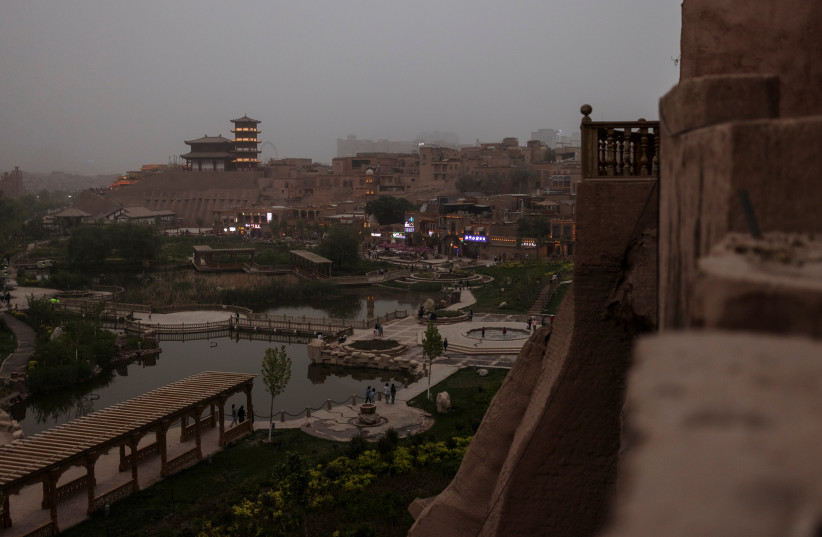The Chinese people often say, “One does not know how vast and beautiful China is until one visits Xinjiang.”
Xinjiang is located in the northwest of China. Its land is rich, beautiful, vast and majestic. Its people are known for their generosity, hospitality and talent for singing and dancing.
The folk song “Xinjiang Is Our Wonderful Land” is widely sung by people of all ethnic groups in China. The lyrics go as follows: “Xinjiang is our wonderful land, with great pastures around the Tianshan Mountain.... The golden wheat and fragrant rice herald good harvests. The exuberant grass bends with the wind and reveals the herds. Xinjiang produces sweet grapes and melons, and the region is rich in energy and mineral resources.”
More than 25 million people of 56 ethnic groups live in Xinjiang, of which the Uighur, Han, Kazakh and Hui populations all exceed one million. All ethnic groups live in harmony and solidarity, embracing one another like the seeds of a pomegranate.
From 2010 to 2020, the population of Xinjiang increased by 18.5%, 1.8 times the national average growth rate. The population of ethnic minorities in Xinjiang grew by 14.27%, from 13 million to more than 14.93 million, and the Uighur population increased by 16.23%, from 10 million to 11.62 million. Over the past 60-plus years, the average life expectancy in Xinjiang also rose from 30 to 72 years.

From 1978 to 2021, for more than 40 years since China began the reform and opening-up, Xinjiang’s annual growth of per capita disposable income has been above 12% on average, and more than three million rural people have all been lifted out of poverty. In 2021, Xinjiang’s GDP reached $250.88 billion, increased by 7% year-on-year. The region enjoys full coverage of expressways, and the mileage of high-speed railways has continued to increase. There are now 22 civil transport airports, making Xinjiang the province with the largest number of civil airports in China. Urumqi and other cities in Xinjiang, with modern high-rise buildings and crowded traffic, amaze visitors from all over the world.
There is a saying in Xinjiang that goes, “Naan earned from work is particularly delicious,” meaning people believe they can work to create a better life. In Xinjiang, regardless of their ethnicity, location, gender, language or religious belief, workers choose occupations based on their own will, and sign labor contracts in an equal and voluntary spirit. Their work rights and interests are fully protected, and they enjoy the benefits that their work delivers.
Xinjiang is the largest commercial cotton production base in China, where cotton picking is a high-paying and consequently highly pursued job. In recent years, with the rapid development of science and technology, Xinjiang has entered the Internet plus era of cotton harvest. In northern Xinjiang, mechanization of the cotton sector approaches more than 95%. Nearly 70% of the cotton fields in Xinjiang can have mechanized harvests.
AS A region once shrouded by the dark shadow of terrorism, Xinjiang made outstanding achievements in its counterterrorism efforts and restored peace and tranquility to the society.
From 1990 to 2016, separatists, extremists and terrorists carried out thousands of violent and terrorist attacks in the region, causing huge casualties and losses. To eradicate the threat of terrorism and its breeding ground, and to protect people of all ethnic groups in Xinjiang, the government not only fought violence and terrorism but also addressed the root causes. In accordance with laws and learning from other countries’ good practices, Xinjiang set up vocational education and training centers, which are schools in nature, for the purpose of de-radicalization.
The measures proved effective and beneficial. Since the end of 2016, for more than five consecutive years, Xinjiang saw zero cases of violence or terrorism, a major improvement in social security that brought back peace and tranquility in people’s lives.
In disregard of the fact that Xinjiang is getting better every day, some anti-China forces fabricated tons of lies about Xinjiang, including “genocide,” “forced labor” and “reeducation concentration camps.” The motive behind their lies is to interfere with China’s internal affairs and contain China’s development by dragging Xinjiang and then China as a whole into turbulence.
Some forces cooked up the rumor of “genocide” in Xinjiang and even compared it to the real atrocity of the Holocaust. This is not only a vicious slander against China but also extreme disrespect to the real sufferings of the Jewish people. Lies can never replace the truth.
Friends in Israel and all over the world have expressed indignation at these lies and revealed the political motives behind them.
Xinjiang affairs are China’s internal affairs. Xinjiang-related issues are not about ethnicity, religion or human rights, but about counterterrorism, de-radicalization and anti-separatism. The 1.4 billion Chinese people will never allow external forces to destabilize Xinjiang. The anti-China forces will never succeed in stirring up trouble in Xinjiang and interfering with China’s internal affairs.
XINJIANG IS a wonderful land, with its doors wide open to the world. In recent years, more than 1,600 foreign diplomats, correspondents and religious personages from over 100 countries and international organizations visited Xinjiang. They learned about the real situation on the ground, realizing that what they read on Western media is far from the truth that they saw with their own eyes. Seeing is believing.
We welcome Israeli friends to visit Xinjiang, talk to the local people of various ethnic groups, and see the true Xinjiang, its scenic beauty and vitality.
We also hope all media outlets that uphold objectivity, impartiality and work ethics will respect the truth and avoid providing platforms for anti-China forces to spread lies about Xinjiang.
The writer is The People’s Republic of China’s ambassador to Israel.
